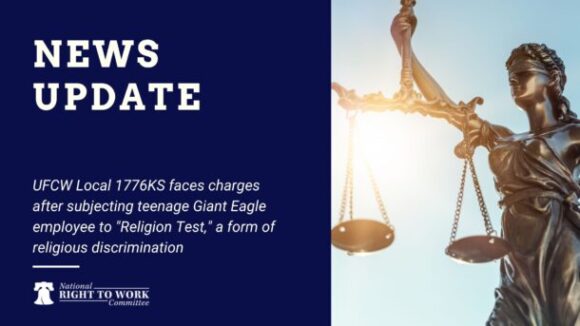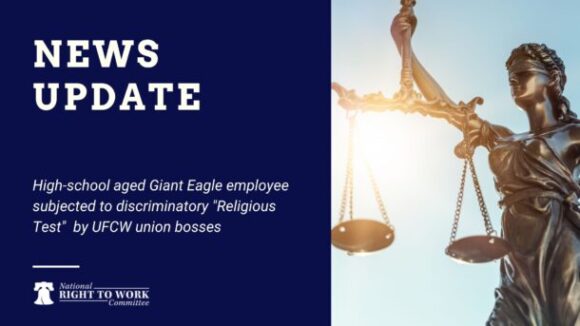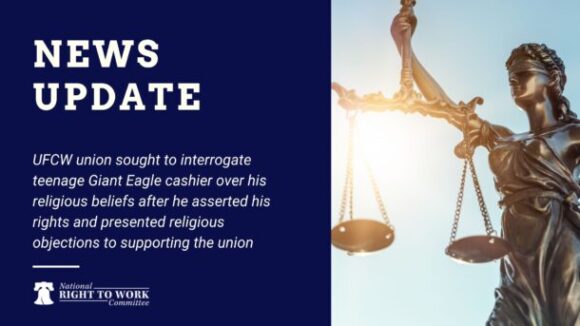UFCW Union Under Fire for Religious Discrimination Toward Teenage Boy
UFCW Local 1776KS faces charges after subjecting teenage Giant Eagle employee to "Religion Test," a form of religious discrimination
What happens to government union bosses when they lose most of their monopoly privileges? The Badger State is now offering Americans across the country an opportunity to find out.
A little over two years ago, Wisconsin legislators approved Act 10, a budget-reform measure including major changes in state policies governing most public-sector unions. (Most public-safety unions were exempted, however.)
Act 10 prohibited union bosses from getting public servants fired for refusal to pay union dues or fees. And it also eliminated union bosses’ monopoly power (commonly referred to euphemistically as “exclusive representation”) to bargain with public agencies over employee merit pay, benefits and work rules.
Act 10 has clearly benefited taxpayers and other citizens who depend on public services by enabling public-sector managers to stop spending millions of dollars on dubious ventures like automatic pay raises for teachers who earn advanced degrees, even if those degrees have no meaningful relationship to their jobs, just because they’re in a union contract. The money saved can either be spent more effectively, or returned to taxpayers.
Act 10 has also benefited many public employees, including teachers with solid track records of success and teachers who are qualified for hard-to-fill subject areas like calculus, biology, chemistry and physics. Increasingly, such teachers now benefit from “bidding wars” among school districts seeking their services, while prior to Act 10 union contracts effectively put a ceiling on what they could be paid.
As a story appearing in the Wisconsin Reporter last week (see the link below) documents, Act 10 has also benefited independent-minded public employees who previously had no choice but to bankroll a government union. Over the past couple of years, tens of thousands of public employees have exercised their option to drop their union membership and cut off all financial support for Big Labor:
Two years after Act 10’s passage, public sector organized labor is reeling in the Badger State. For some unions, the effects of Act 10 may be fatal.
AFSCME Council 24’s dues-paying membership fell from about 5,900 security and safety employee members pre-Act 10 to 690 in the early months of this year – an 88 percent drop — according to information posted on the Facebook site of theWisconsin Association for Correctional Law Enforcement and obtained by Wisconsin Reporter. . . .
Wisconsin Reporter left messages — an email and two voice mails — with [Council 24] Executive Director Marty Beil over the past two days requesting comment and membership numbers. Beil did not respond.
In December, however, he told the Wisconsin State Journal that [Council 24’s] overall dues-paying membership had dropped from 22,000 pre-Act 10 to fewer than 10,000. . . .
AFSCME’s decline in Wisconsin has been precipitous.
The U.S. Labor Department reports the membership of Wisconsin’s AFSCME Council 40 dropped from 31,730 to 2011 to 20,488 this year.
The decline for Council 48, which represents city and county workers in Milwaukee County, was even more dramatic — a 61-percent drop in membership over two years, from 9,043 members in 2011 to 3,498 now.
The teachers’ unions haven’t been spared.
The Wisconsin Education Association Council and American Federation of Teachers-Wisconsin have considered merging, partially in response to Act 10.
Incoming WEAC President Betsy Kippers did not respond to an email seeking comment this week and could not be reached by phone.
Outgoing WEAC President Mary Bell told the Wisconsin State Journal in October that WEAC membership is down about 29 percent, from a pre-Act 10 level of about 98,000 members

UFCW Local 1776KS faces charges after subjecting teenage Giant Eagle employee to "Religion Test," a form of religious discrimination

High-school aged Giant Eagle employee subjected to discriminatory "Religious Test" by UFCW union bosses

UFCW union sought to interrogate teenage Giant Eagle cashier over his religious beliefs after he asserted his rights